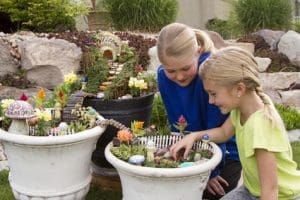Simple gardening projects that count as exercise for kids
Gardening is a fantastic way of merging exercise, fun and education. While you’re at it, you bend, squat, stretch and lift – movements that help build strength, flexibility and endurance.
Once the greenhouse is constructed, kids can stay involved by planting seeds, watering plants and monitoring the growth inside their new creation.
Introducing children to gardening offers a unique opportunity to keep them active while instilling an appreciation of nature.
As they move about, they learn about plants, animals and the environment.
These simple gardening activities for kids are designed to get them moving while providing enjoyable and educational learning experiences.
Plant a garden
Establishing a garden is an excellent way to get kids moving. The process involves physically exerting activities such as clearing the field, digging holes and planting the seeds.
A small flower or vegetable garden is a good starting point. Choose a sunny spot in your yard and mark out the area. Provide age-appropriate tools and have the child clear and dig the patch.
Support them in measuring and mixing the compost or fertilizer, then guide them in making holes, planting the seeds and applying mulch.
Digging is a form of aerobics that engages multiple muscle groups in the arms, neck, shoulder and back, which helps build upper body strength. If children are old enough to use a spade, stepping on it to shovel dirt will work the legs and buttocks, providing an all-around workout.
Pick easy-to-grow plants like tomatoes, herbs and sunflowers. They are easy to manage, giving kids the satisfaction of seeing the fruits of their labor within a relatively short time.
Provide long-handled tools to children with mobility issues and provide support to make the experience enjoyable.
Watering workout
Watering the garden or yard might seem like a simple maintenance task, but it’s an excellent way for kids to get some exercise. Handling a hose and carrying watering cans around requires strength and coordination. This makes it a good workout for the arms and core. They’re getting a bit of cardio as they move around from one plant to another.
Provide younger children with appropriately sized watering cans. Fill them partially to start, increasing the quantity of water as they grow stronger. While you’re at it, teach them about the needs of different plants and the value of regular care.
Make watering more engaging by turning it into a routine or a fun challenge. Designate specific times to do the activity or hold a competition to see who can carry the most water without spilling. If it’s a hot day, wind down the activity with a sprinkler party in the garden or fill balloons with water and have a friendly fight in the yard
Make a fairy garden

An outdoor fairy garden
If you have young children, they will love creating a fairy garden from scratch. Invite some of their friends over and turn it into a playdate. Gardening, just like outdoor playground games, encourage physical activity which teaches children how to foster creativity and forge a connection to nature. They must work together to plan what to include in the garden before they begin digging, planting, arranging and decorating.
Have the group collect natural materials to make the fairy garden. Create a miniature landscape using rocks, soil, pebbles, twigs and plants. Show them how to create pathways, houses and furniture for the “fairies.” Provide small figurines and toys to decorate the magical garden.
Harvest vegetables and fruit
Harvesting is another physically engaging activity that kids of all ages will love. Have them squat to pick low-growing produce like carrots, turnips and strawberries. This works their leg muscles, which improves balance. Encourage stretching to reach taller plants to build flexibility and coordination.
Provide baskets for collecting the harvest and challenge them to carry them to a designated spot. Make it more exciting by organizing a “race” to see who fills their basket first, adding a cardio element to the activity.
Construct a mini greenhouse
Building a mini greenhouse might sound complex, but it can be a rewarding project for kids that doubles as exercise. The key is to scale it down depending on the children’s ages and to use easy-to-handle materials like recycled plastic bottles and small wooden frames. If your budget allows it, purchase a pre-made kit and put the pieces together.
The little builder will be engrossed in numerous physically inducing tasks, such as lifting and assembling. There’s bending, reaching, and sometimes even hammering or screwing parts together. These activities keep the muscles engaged, improves coordination and boosts cognitive capabilities like problem-solving.
Children with cognitive disorders like Attention-Deficit/Hyperactivity Disorder (ADHD) will flourish from the structure and clear sequence of building tasks. The hands-on activities allow them to expend energy constructively and support sensory stimulation. This helps them maintain focus on the task on hand to get the full benefits of the activity.
Once the greenhouse is constructed, kids can stay involved by planting seeds, watering plants and monitoring the growth inside their new creation. This ongoing care keeps them active and fosters a sense of responsibility and accomplishment.
Nurture health through activities for kids
Gardening activities for kids provide a healthy balance of exercise and education. Whether they’re digging, planting, watering, harvesting or building, the movements they make help burn calories and build muscle.
Other than promoting physical health, you’re encouraging children to spend time outdoors. They also get to learn about nature and develop an appreciation for the environment.
Children of all ages are sure to have fun engaging in these simple gardening projects while getting a workout and learning valuable life skills.
I invite you to check-out more of my work. All you have to do is tap the links in my author box just below.
For Bill’s Chipur info and information articles, review all of the titles or by category – scroll down on mobile, right sidebar on desktop.


Beth is the mental health editor at Body+Mind. She has five-plus years of experience writing about behavioral health, specifically mindfulness-based cognitive therapy. Beth also writes about the power of human design to reveal our full potential and purpose. You can find her on X @bodymindmag.



